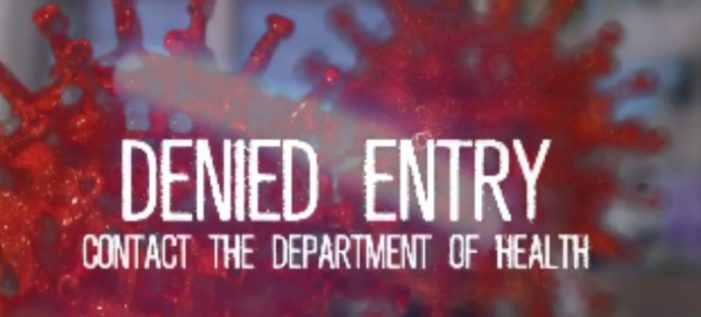Updated: Less than 24 hours after the city of Miami shut down all restaurants, clubs, bars, gyms and other locations where people congregate and could, possibly, transmit the coronavirus COVID-19 disease, Miami-Dade County followed with the same kind of emergency order, closing all those establishments and allowing kitchens to stay open for curbside or drive-through take-out and 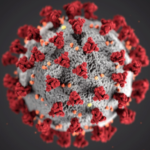 delivery only.
delivery only.
Pharmacies, grocery stores, gas stations and convenience stores would be able to remain open. Nothing about houses of worship or transit, which should probably should be shut down if people are being told to stay home for the second day in a row of the next two weeks.
Both local governments, grappling with an unprecedented global health crisis, said they were following the Los Angeles model with the forced closures. But by Monday afternoon, six Bay areas had already issued a shelter-in-place order — meaning residents are under imposed isolation, sort of like in Italy and China. So Ladra is certain we can expect that kind of lockdown next as the numbers continue to grow.
And the number of positives will continue to grow exponentially as more people are tested. There were 176 known cases of COVID-19 in Florida early Tuesday, including 32 in Miami-Dade, which is more than twice as much as Sunday (13). One of those is a Miami Beach employee who tested positive after returning from a vacation abroad. He or she has not returned to work since and is in isolation.
Also on Day 2, it was disclosed that someone who worked on Tuesday or Wednesday, March 10 or 11, in Judge William Altfield’s Courtroom 6-2 at the Richard E. Gerstein Justice Building, the county criminal courthouse at 1351 NW 12 Street, has tested positive for coronavirus COVID-19. Anyone else who was there on those days are asked to self-monitor — remain alert for the symptoms — for the next 14 days, as recommended by the Center for Disease Control.
Read related: More Miami-Dade closures, screenings on ‘fluid’ Day 1 of COVID-19 isolation
After that, Honorable Bertila Soto, Chief Judge of the Miami-Dade Courts, issued an order cancelling all non-emergency court 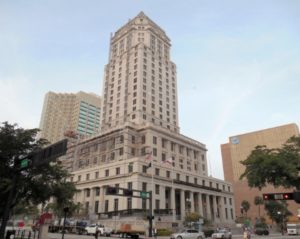 proceedings through Friday, March 27th. Furthermore, all civil (circuit and county), family, domestic violence, probate, small claims, and appellate proceedings are suspended through Monday, March 30.
proceedings through Friday, March 27th. Furthermore, all civil (circuit and county), family, domestic violence, probate, small claims, and appellate proceedings are suspended through Monday, March 30.
The only exceptions will be for “mission-critical court matters” such as bond hearings, arraignments for in-custody defendants, Baker Act and Marchman Act proceedings, juvenile shelter and detention, and access to an intake window for the filing of temporary injunctions (domestic violence, dating, stalking, repeat and sexual violence and risk protection orders).
All hearings on final injunctions are canceled and to be re- scheduled on a future date. All temporary injunctions will be extended and will remain in full force and effect until the next hearing date. Trials that were underway before the Florida Supreme Court issued its order on Friday will continue. But all non-emergency court proceedings, including but not limited to: special set hearings, trials, and all calendars, including but not limited to, motions, pretrial motions, foreclosures, uncontested divorces and case management conferences, will be cancelled and re-scheduled in some unforeseen future.
Mayor Carlos Gimenez signed an emergency order Tuesday that effective at 11 p.m. ordered the closure of “all restaurants, bars, taverns, pubs, night clubs, banquet halls, cocktail lounges, cabarets, breweries, cafeterias, and any other alcohol and/or food service business establishment with seating for more than eight people.” Cabarets? Where is there a cabaret?
Kitchens that are part of essential services — airports, hospitals, etc. — don’t count. But movie theaters, concert houses, auditoriums, playhouses, bowling alleys, arcades, fitness gyms — except those in hotels or condo buildings — are also closed.
The rule applies to all of Miami-Dade, including incorporated municipalities. 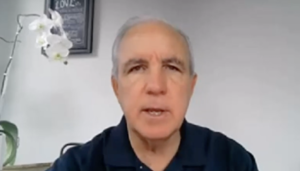 But cities and towns can make even more stricter rules themselves.
But cities and towns can make even more stricter rules themselves.
“Now, this is not a measure that I’m taking without grave concern for all the workers and businesses the are being impacted,” Gimenez said via video from self-isolation at home. And it’s creepy how dead f;*&%ng serious he looks.
The Miami-Dade order was announced at an 11 a.m. press conference by Deputy Mayor Jennifer Moon with Miami Beach Mayor Dan Gelber at Joe’s Stonecrabs, and Ladra has to wonder if they had lunch afterwards or took a couple of pounds to go. Talk about provisions!
And shouldn’t they be having press conferences via video, too, so they don’t infect the reporters or vice versa?
Gimenez had invited the owner of Joe’s and Felipe Vals, owner of Versailles, to be at the press conference to drive home just how difficult this will be for them and their workers. So maybe Jen and Dan got pastelitos and croquetas, too.
“I know this is a very difficult time,” Gimenez said. “But the only way to get ahead of COVID-19 and stop the spread of this virus is by taking some very extraordinary actions.”
Yeah, noooooooowwww he says that.
Read related: Government meetings are cancelled; 11 p.m. curfew ordered for businesses
Gimenez was slow to move on this pandemic. It must have been painful for him to follow Miami Mayor Francis Suarez again, after first criticizing him for moving too quickly to cancel events like Ultra and Calle Ocho. Grimenez said that was unnecessary — then turned around and cancelled the Dade County Youth Fair and a bunch of other events. Now a Republican congressional candidate, the county mayor didn’t really take the pandemic seriously until President Donald Trump took it seriously — and that was after both were exposed themselves to a Brazilian delegation where someone tested positive.
All it took was for it to hit close to home.
Grimenez tested negative but is in isolation at home, por si las moscas.
Suarez has tested positive and is also in isolation at his home, separated from his family and bodyguards. But he also said Monday via Facebook video that 40 people who had been exposed to him in the few days before he was confirmed to have COVID-19 have all tested negative. This includes his wife and kids. The mayor’s coronavirus diary is kind of a mushy love story — how he had to 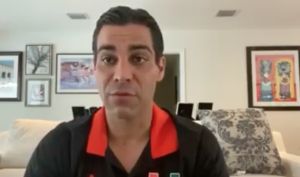 wave to his wife through the glass — rather than informative. Meanwhile, she’s probably on vacation.
wave to his wife through the glass — rather than informative. Meanwhile, she’s probably on vacation.
But Suarez hopes that by watching him survive the novel virus, and he has only begun to show some minor congestion, he can bring calm to the masses. That only works if he stays healthy. Or doesn’t stop suddenly after Day 9 or 10.
“Right now, it’s looking like I’m in the 80 percent of the population who gets mild to no symptoms,” Suarez said in his fifth journal entry on the sixth day with COVID-19. “Obviously I’m taking this seriously and I’m hoping this is all that I feel. But we have to be very vigilant and careful, not just for ourselves but for our families and particularly for the elderly in our community that we are seeing across the world are experiencing extreme symptoms and can even be fatal.”
“And we are seeing how hospitals all over the world are being overrun. So this it’s something we’re taking seriously as a city,” he said, mentioning the shutdown of restaurants and other businesses.
“We’re recommending social distancing and if you can stay home, stay home. Don’t go outside if you can avoid it,” Suarez said.
Which leads to the question about transit and how many more days 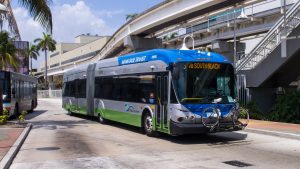 public transportation will be operating. If everything is closed and we need to avoid being in any closed space with more than eight people, why are buses and MetroRail still running? How is a restaurant or a bar different than a bus or a train car? It’s not. There are more than eight people on a normal bus.
public transportation will be operating. If everything is closed and we need to avoid being in any closed space with more than eight people, why are buses and MetroRail still running? How is a restaurant or a bar different than a bus or a train car? It’s not. There are more than eight people on a normal bus.
Ladra is the last person to advocate for a total police state like shutdown, but this isolation containment will only work if everybody does it. And I am also thinking about the bus drivers who have to come into contact with hundreds of people — although maybe not that many these days — and certainly are at high risk of getting it and passing it along.
Even the Village of Palmetto Bay has taken some extreme measures, cancelling Tuesday’s Committee as a Whole meeting and all task force and committee meetings through the end of March, according to an email from Mayor Karyn Cunningham.
Village Hall is open only from 10 a.m. to 2 p.m. weekdays with a skeleton crew and only for select services, like existing permits 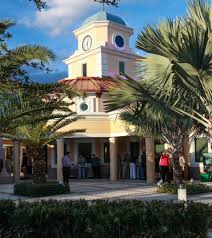 and inspections. No new permits or inspections will be scheduled until after April 1 and no new planning or zoning applications will be accepted. No garage sale permits, occupational license permits or special events permits will be issued until after April 1. Employment applications are to be mailed and not delivered in person, but there are no interviews until after April 1.
and inspections. No new permits or inspections will be scheduled until after April 1 and no new planning or zoning applications will be accepted. No garage sale permits, occupational license permits or special events permits will be issued until after April 1. Employment applications are to be mailed and not delivered in person, but there are no interviews until after April 1.
The Farmer’s Market, non-profit events, sports games, practices and recreational programs are cancelled. Golf cart, passport and public request services (huh? okay why that?) are cancelled through April 1 also.
And the I-Bus service to and from Metrorail and the Park and Ride at St. Richard’s are both closed as of Tuesday. The FreeBee van will continue operations and the Park and Ride at Palmetto Bay Park was still open as of Tuesday night.
In Miami — where daily updates are published on the website — the commissioners are all in isolation, calling the manager with their own ideas, but the communication is not with everyone. Commissioner Ken Russell complained on twitter Tuesday that he learned of the city’s shutdown of establishments from the media. But on Monday, about 5:40 p.m., Russell texted Ladra — and guys, this thing can’t be transmitted over the phone — that things were going well. He seemed in the know.
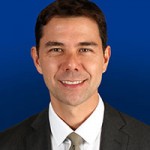 “Everything is very fluid day by day,” he said, using that word again. Then: “I’m happy with how the city administration is handling things.”
“Everything is very fluid day by day,” he said, using that word again. Then: “I’m happy with how the city administration is handling things.”
But on Tuesday, he wasn’t as happy and tweeted “reading things in this article that I should be hearing from the city manager. Our team has been working hard today communicating new curfew/caps with local restaurants. Communication is key to trust. Tomorrow’s #Businessblackout is a major policy step that was not communicated.”
Well, maybe not to him. And maybe he ought to read Political Cortadito because we had it last night.
But it leads to an important question: Who is in charge in the city of Miami? It isn’t the commission as a whole. Ladra doesn’t think its the mayor, who was already more like a weak title than and else and is more interested in his temperature on a moment to moment basis, as he should be and we all would be.
Read related: More Miami power plays prove ADLP is the new boss, runs the show
Is it brand spanking new City Manager Art Noriega? And does that mean it’s really Commissioner Alex Diaz de la Portilla, who Ladra has already identified as the new boss.
Around 5 p.m. Monday, Commissioner Diaz de la Portilla texted Ladra with the first clue about the shutdown — hours before it was announced by Noriega. “Working through the legalities [of] closing down establishments,” he texted, unsolicited.
“We are at war with a very aggressive virus. We are taking the appropriate measures to counter it,” Diaz de la Portilla texted Tuesday, saying the city was getting ready to test its homeless population and talking to churches about cancelling services.
The power shift created when he was elected only got stronger when he got his wish for city manager and there is no doubt now 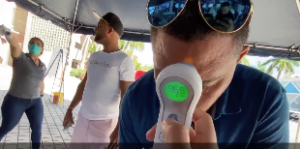 that ADLP is in charge. As someone in City Hall told Ladra recently: “It’s now all about keeping Alex happy and giving him what he wants.”
that ADLP is in charge. As someone in City Hall told Ladra recently: “It’s now all about keeping Alex happy and giving him what he wants.”
Meanwhile, “we did turn some people away,” Noriega said Tuesday, about the city of Miami’s new screening process — that includes a temperature read — on both employees and visitors entering (or not, as it were) administrative buildings and City Hall.
Those people were provided with the telephone number for the Florida Department of Health at 866-779-6121.

